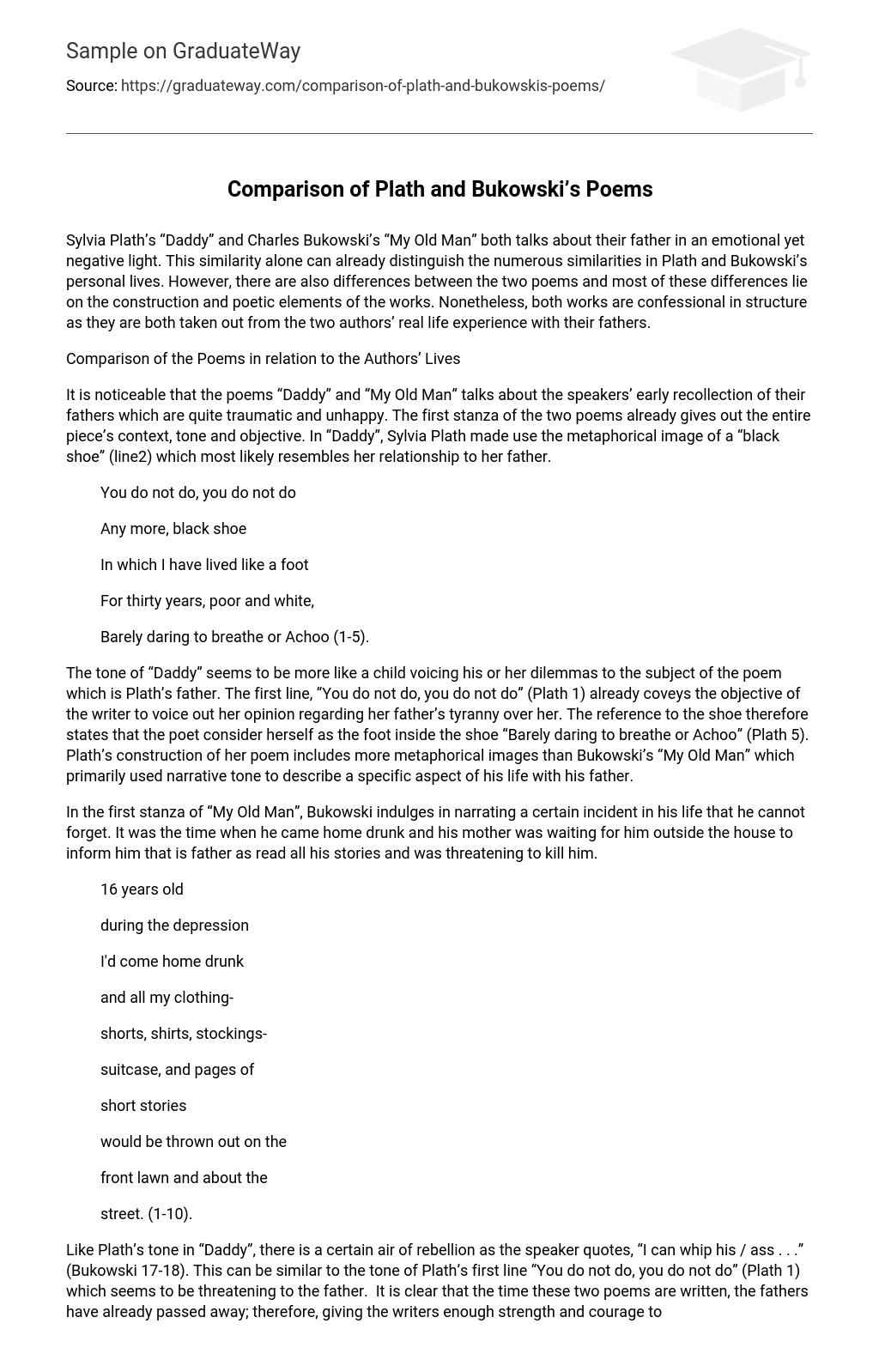Sylvia Plath’s “Daddy” and Charles Bukowski’s “My Old Man” both discuss their fathers in an emotional yet negative light. This similarity alone distinguishes the numerous similarities in Plath and Bukowski’s personal lives. However, there are also differences between the two poems, mostly in their construction and poetic elements. Nonetheless, both works have a confessional structure as they are based on the authors’ real-life experiences with their fathers.
Comparison of the poems in relation to the authors’ lives.
It is noticeable that the poems Daddy” and “My Old Man” discuss the speakers’ early traumatic and unhappy memories of their fathers. The first stanza of each poem sets the context, tone, and objective for the entire piece. In “Daddy,” Sylvia Plath uses a metaphorical image of a “black shoe” (line 2) to represent her relationship with her father.
You do not do, you do not do
Any more, black shoe.
In which I have lived like a foot
For thirty years, poor and white,
Barely daring to breathe or sneeze.
The tone of Daddy” seems to be that of a child voicing their dilemmas to the subject of the poem, which is Plath’s father. The first line, “You do not do, you do not do” (Plath 1), conveys the writer’s objective to voice her opinion regarding her father’s tyranny over her. The reference to the shoe implies that the poet considers herself as the foot inside it, “Barely daring to breathe or Achoo” (Plath 5). Plath constructs her poem using more metaphorical images than Bukowski’s “My Old Man,” which primarily uses a narrative tone to describe a specific aspect of his life with his father.
In the first stanza of My Old Man,” Bukowski narrates a memorable incident from his life. He had come home drunk, and his mother was waiting outside to inform him that his father had read all of his stories and was threatening to kill him.
When I was 16 years old during the depression, I used to come home drunk and all my clothing – shorts, shirts, stockings – along with my suitcase and pages of short stories would be thrown out on the front lawn and about the street. (1-10).
Like Plath’s tone in “Daddy”, there is a certain air of rebellion as the speaker quotes, “I can whip his / ass . . .” (Bukowski 17-18). This can be similar to the tone of Plath’s first line which seems to be threatening to the father. It is clear that at the time these two poems were written, their fathers had already passed away. Therefore, this gave both writers enough strength and courage to voice out their hidden grudges towards their fathers.
However, both poems convey a sense of longing for the care of their fathers. Bukowski’s poem ends with a poignant suggestion that he and his father were never very close. When he gave his father the story about the rich man who died after being kicked by his horse following a huge fight with his wife, he considered it to be the closest bond they ever shared.
He took it, walked out, and closed the door.
I guess that’s as close as we ever got. (Bukowski 67-72)
The poignancy of the failure of a meaningful child-father relationship is evident in the 12th stanza of Plath’s “Daddy.” The stanza discusses the personal burden she experienced when her father passed away.
I was ten years old when they buried you.
When I turned twenty, I attempted to die
So that I could be with you once again,
I even thought your bones would suffice (57-60).
Despite the similarities in Plath and Bukowski’s works, the differences in structure are quite visible. Plath prefers to use metaphorical imagery, while Bukowski uses a narrative style. Both poets recall memories with their fathers, but their unique presentation styles distinguish one poem from another despite having a common theme.
Plath uses Adolf Hitler, Nazis, and a black shoe to further elaborate on the difficult situation she had with her father. In contrast, Bukowski recalls a specific memory with his father and allows it to represent their entire relationship.
In summary, although Plath’s work is longer than Bukowski’s, both poems provide vivid images in readers’ minds through metaphors, symbolism, and figurative language.
The language of the two pieces also differs in tone and structure. Bukowski’s format seems more informal due to the consistent use of small caps in the narrative except for the quotations. In contrast, Plath capitalizes every first letter in every line. There is also an ambience of maturity in Bukowski’s words which is somewhat absent from Plath’s. Plath’s poem is more dramatic because it takes on a child’s voice, using words such as Daddy” as an endearing reference to a father and “Achoo” to denote a childlike quality within the poem. On the other hand, Bukowski’s technique is more direct and literal than Plath’s.
Conclusion:
There are indeed many comparisons to be made between Sylvia Plath’s Daddy” and Charles Bukowski’s “My Old Man.” Their similarities range from the common theme of expressing their emotions towards their fathers to their comparable use of symbolism. However, the differences in their individual styles and structures serve as determinants for the uniqueness of their works. Despite both poets attempting to voice feelings of abhorrence towards their fathers, it cannot be denied that these two men were still influential in molding them into two of the world’s greatest poets.
Works Cited
- Bukowski, Charles. My Old Man.” Love Is A Dog From Hell. Black Sparrow Press: Santa Rosa, CA, 1977, p. 292.
- Plath, Sylvia. “Daddy.” An Anthology of 100 Poems by 100 Poets. Eds. Harold Pinter, Geoffrey Godbert and Anthony Astbury. Grove Press: New York, NY, 1986, pp.110-113.





